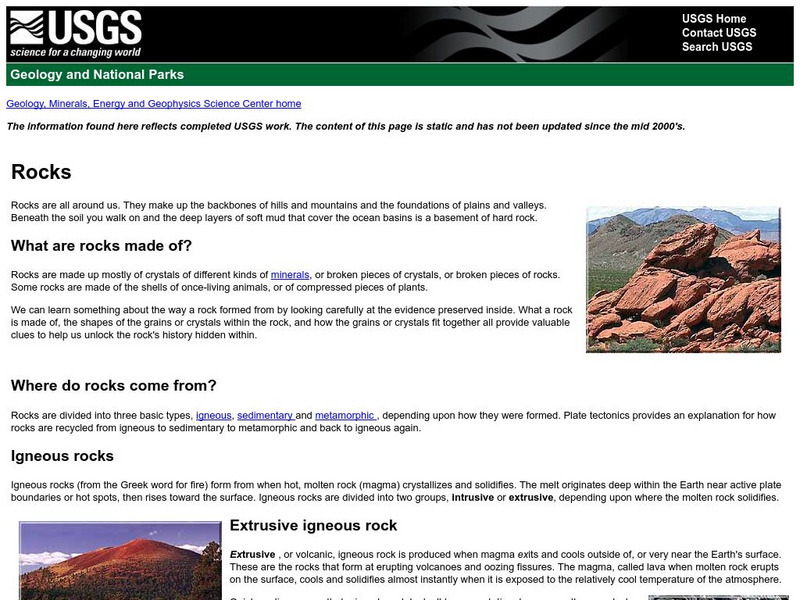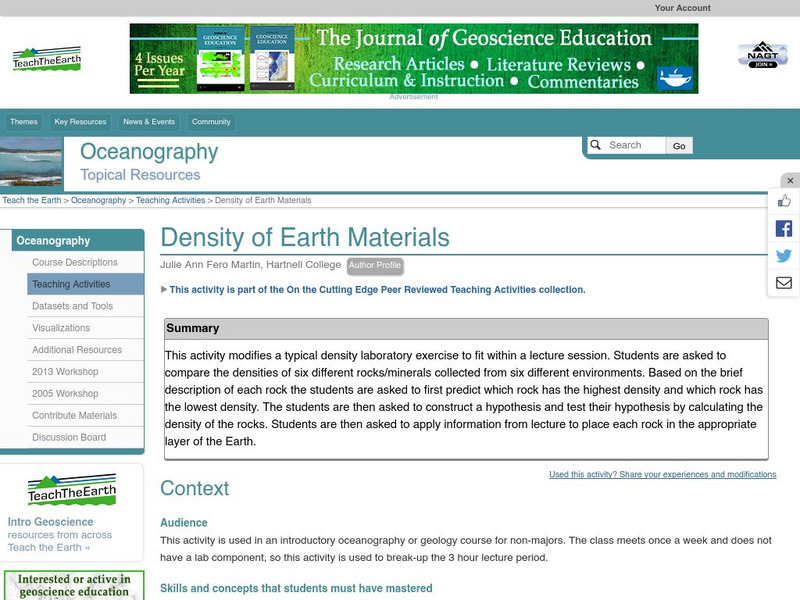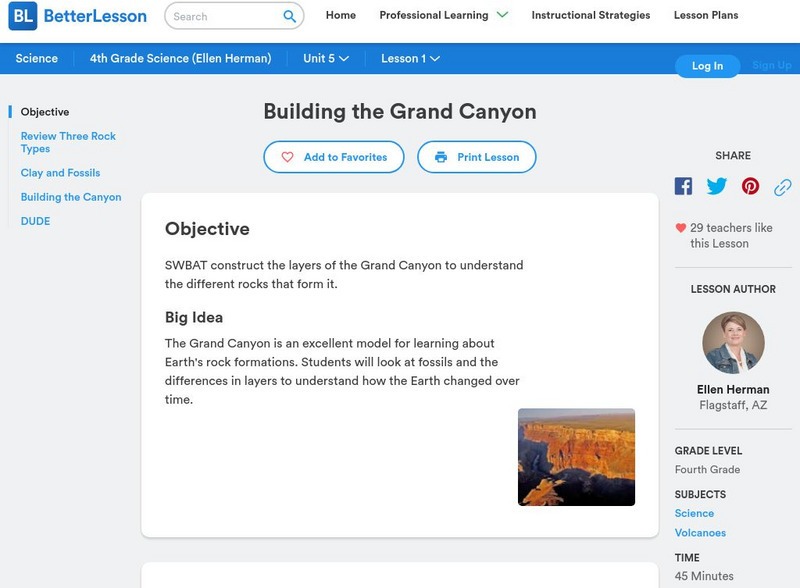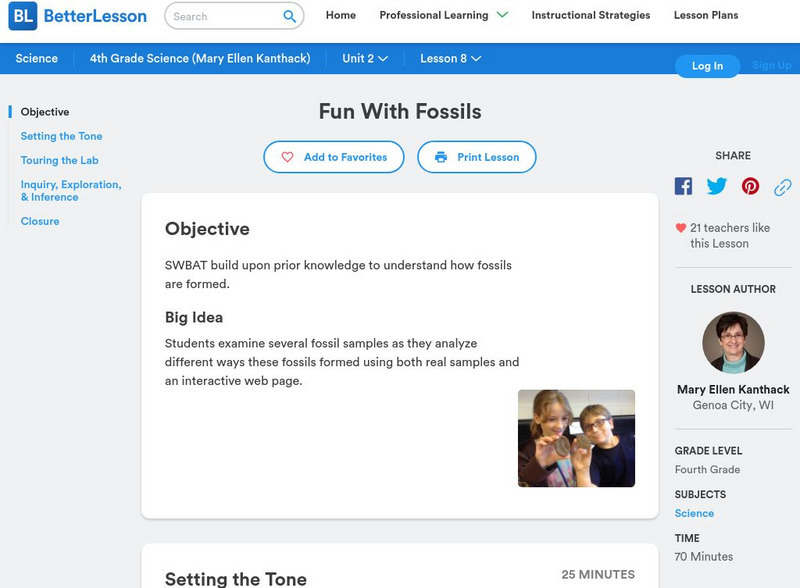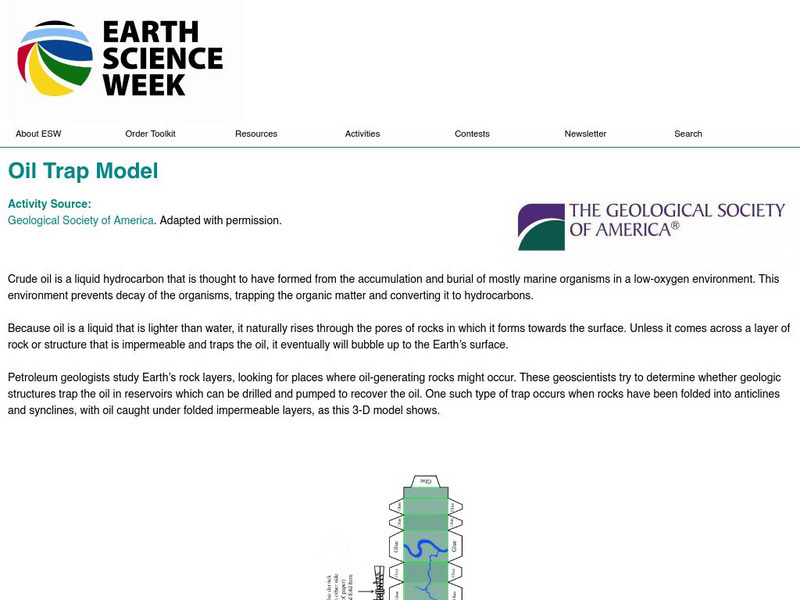Indiana University
Indiana University: Generalized Stratigraphic Column of Indiana Bedrock [Pdf]
The discipline of stratigraphy looks at the order and relative position of strata and their relationship to the geological timescale. This chart shows the strata of Indiana from the Pre-Cambrian to the Pennsylvanian Periods.
Utah Education Network
Uen: Fossil Inferences
Arrange fossil pictures in sequence from oldest to youngest.
Science Education Resource Center at Carleton College
Serc: Geologic History Field Investigation Minnehaha Falls
An inquiry-based geology field investigation where students investigate sedimentary geology, stream processes, topography, rock layers, and land surface features as well as study past changes in the depositional environment in the area.
Science Education Resource Center at Carleton College
Serc: Mn Step: Relative Dating Using "The Block"
This lesson involves an innovative strategy for introducing the concept of relative dating using a block of wood that has been painted, damaged, and nailed. The task for students is to analyze the order in which these events happened and...
Other
Prehistoric Planet: Rock Layers: Timeline of Life on Earth
Offers an easy to understand explanation of the earth's layers and the fossils we find in each layer. It explains how these are interpreted by scientists to represent the evolution of animal and plant life through the geological eras.
Other
The Geologic Society of America: Towel Geology [Pdf]
This lesson is a demonstration in how geological layers form and erode using just a stack of towels. The author describes this lesson as GeoArt, which means one looks at geologic processes through both a scientific and an artistic lens.
US Geological Survey
U.s. Geologic Survey: Rocks
What are rocks made of? Where do rocks come from? What is an igneous rock? These are just some of the questions answered by the scientists of the U.S. Geologic Survey.
National Association of Geoscience Teachers
Nagt: Stratigraphy of Ponca State Park
After a study of the principle of original horizontality and the law of superposition, and how to determine the ages of rock layers and how they are formed, students go on a field study to observe and gather information about rock...
Science Education Resource Center at Carleton College
Serc: Density of Earth Materials
Students compare the densities of six different rocks/minerals collected from different environments, and then predict which rocks have the highest and lowest densities. Then they construct and test their hypothesis by calculating the...
American Geosciences Institute
American Geosciences Institute: Earth Science Week: Exploring Porosity
Experiment to find out which size of gravel has the most porosity by measuring volume.
University of California
The University of California: Chronological Methods 3 Superposition
One of the most fundamental principles of archaeology is the Law of Superposition. This website provides a diagram showing you the Law of Superposition.
CPALMS
Florida State University Cpalms: Florida Students: Weathering, Erosion, and the Rock Cycle
Learn about the processes involved throughout the creation of sedimentary rock.
Sophia Learning
Sophia: Geology: Sedimentary Rocks
Listen to this podcast which explains the various processes that form sedimentary rock. [0:32]
Better Lesson
Better Lesson: Building the Grand Canyon
The Grand Canyon is an excellent model for learning about Earth's rock formations. Students will look at fossils and the differences in layers to understand how the Earth changed over time. Resources included are detailed instructions...
Better Lesson
Better Lesson: Fun With Fossils
Fourth graders examine several fossil samples as they analyze different ways these fossils formed using both real samples and an interactive web page.
CK-12 Foundation
Ck 12: Fourth Grade Science: Earth Science: Relative Ages of Rocks
[Free Registration/Login may be required to access all resource tools.] Looks at how stratigraphy can be used to determine the relative ages of rocks, how unconformities occur, ways to match rock layers in different areas, and how...
Utah STEM Foundation
Utah Stem Action Center: Evolution of Earth
Have you ever noticed how rocks appear to have stripes in them? What do you know about how fossils are formed? Explore this instructional activity to learn about the evolution of the earth and how we know what it used to be like long ago.
Energy4Me
Energy4me: Name That Tune
Students will learn that scientists use seismic technology (sound waves) to map patterns of rock formations below the surface of the earth and that different types of rocks affect sound waves.
CK-12 Foundation
Ck 12: Life Science: 4.4 Fossils
Understand fossils and the fossil record as it relates to Earth's history.
American Geosciences Institute
American Geosciences Institute: Earth Science Week: Oil Trap Model
Students make and study a 3-D model of a cross section of the earth where oil has formed.
American Geosciences Institute
American Geosciences Institute: What Can We Tell From the Fossil Record?
Find out what the fossil record tells scientists about the geologic and biological history of the Earth.
Curated OER
Prehistoric Planet: Rock Layers: Timeline of Life on Earth
Geological eras showing the fossils found in each rock layer.


![Indiana University: Generalized Stratigraphic Column of Indiana Bedrock [Pdf] Graphic Indiana University: Generalized Stratigraphic Column of Indiana Bedrock [Pdf] Graphic](https://d15y2dacu3jp90.cloudfront.net/images/attachment_defaults/resource/large/FPO-knovation.png)



